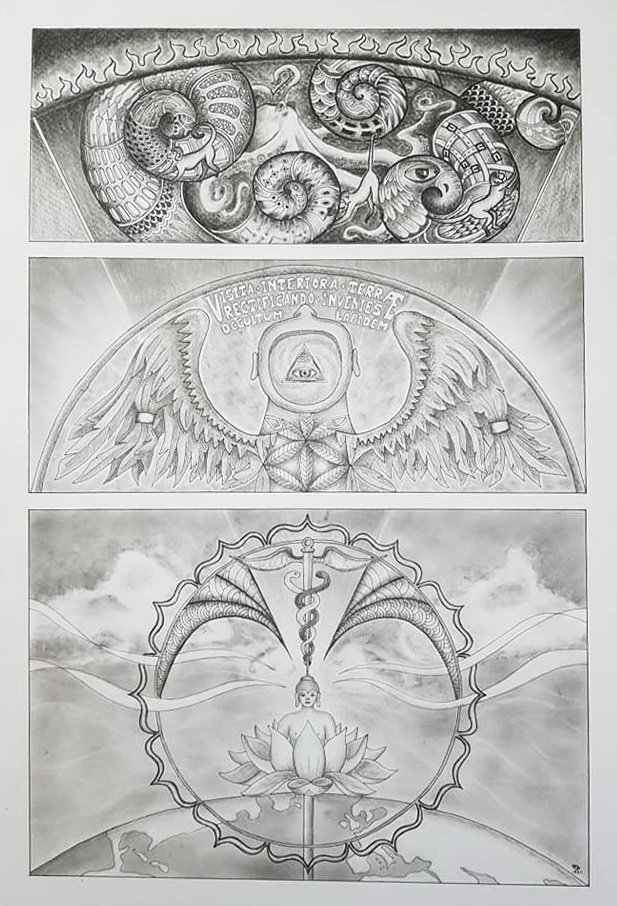-
Posts
2,502 -
Joined
-
Last visited
Content Type
Events
Forums
Downloads
Quizzes
Gallery
Blogs
Everything posted by Sunmaster
-
There is nothing wrong if wealth comes as a result from spreading beneficial ideas. It is only wrong if you misuse those ideas for the sole purpose of making money.
-
Good. Its a starting point. In any case, it is no great mystery that meditation can alleviate physical illnesses. Just think how many physical problems arise from unhealthy mental states...depression, anxiety, stress....they all have negative physical manifestations. Meditation can help bring the mental side back to health, and then the physical will follow suit. No anxiety = no high blood pressure (for example).
-
I'm not going to try to convince you of the contrary, but my suggestion is that if you want to criticise someone's work, the least you should do is know what you're criticising. "I haven't read anything he wrote, but I think it's all nonsense " is simply not good enough.
-
That may be so, but when they are quoted here, it is always in an attempt at disproving or ridiculing spirituality as a whole. In other words, people here use legitimate criticism of organized religion to discredit spirituality altogether, when they are in fact 2 very different things.
-
Even if you call them spiritual organisations instead of religious organisations, they remain organisations. They can fall in the same pitfalls. Spirituality in its true meaning, is the personal connection one has with his inner self.
-
His arguments, although presented in a coherent and eloquent manner, are nonetheless very simplistic. They refer to organized religion and say nothing about spirituality. I don't understand why people like him or Richard Dawkins are regarded as authorities about spirituality, when they obviously don't have a clue about it. All they do is criticise religious dogma, which is a completely different pair of shoes. I guess they are quoted so often here by people who also confuse religion with spirituality.
-
Not sure where you got that from, but I highly doubt she would self-proclaim that, surely not to make financial gains.
-
Sure, whatever makes you happy.
-
OK, you win. ????
-
Not at all. The same way I don't feel I'm stupid if I don't understand quantum entanglement. Some do understand it and I don't have a problem with that either.
-
The lack of comprehension is entirely your own doing. I can't do anything about that, I'm afraid. If I attempted to read a paper about quantum entanglement and don't understand anything, I wouldn't blame the guy who wrote it. Does that make sense?
-
No need to google it. I will define it the way I understand it. For me, intelligent design doesn't mean that the world we live in ought to be perfect, although in a way it is perfect. With all of its imperfections, it is the perfect environment for the tasks and lessons we set out to receive. This is true for me. Others may not see it that way and that's fine too.
-
It wasn't meant to be an explanation of intelligent design. You asked a question about male nipples, as if that would disprove intelligent design. I simply answered that.
-
No need to read the whole thread. A simple Google search will provide the answer. Men have nipples because nipples develop in the womb before embryos become distinctly male or female. So by the time a Y chromosome kicks in to distinguish a fetus as male, the nipples have already secured their place.
-
Meditation can take up as little as 20minutes a day. We spend a lot more time doing irrelevant and sometimes harmful things. But you're right, my personal circumstances allow me to spend time meditating and educating myself instead of worrying where my next meal comes from. For that I'm very grateful.
-
What happens when you don't think?
-
In your example, if the prospective homebuyers would KNOW of the flood danger and still buy the house, THEN that would be lacking common sense or be irrational. If they don't know about it, their choices would still be dictated by rational thought. I think you're afraid of what could lurk in the depths of the subconscious, which you seem to equate with the label "irrational". You think that "rational" brings order and understanding in the outer world. What you don't see yet however, is that the subconscious, the irrational (=that which goes beyond the rational) is subject to rules of a higher order. Not chaos and ignorance, but a reality that is more true and pure, because not distorted by the rational mind. This is the reality that becomes apparent when using the inner senses, not the outer senses, not the rational mind.
-
No reason to be sorry Vincent. We are just talking about different things then. What you classify as irrationality in your story is just another form of rationality. Meaning, they still use their mind to come to a decision of buying the house. Their reasons, whatever they may be, are still based on conscious thought and evaluation of their options. In this case it would be "the great view". I speak of irrationality as a non-rational state that is beyond the mind (not achieved by thinking). I doubt that the couple in your story would go to the house, start meditating, go into a non-rational state, and then buy the house because of that. ????
-
Great post. The thing that made me think though, is in the very last sentence. "Avoid the hussles of teaching irrational people." From this I deduct that for you, rational is good and irrational is bad. Correct? What does it mean "being irrational"? A state of non-rationality. But here is the problem...both a baby and a great yogi experience a state of non-rationality. The states are not the same however, because the first comes before rationality and the latter comes after rationality. It transcends it and includes it into something bigger. In this context, being irrational becomes a good thing, and rationality ceases to be the only option.
-
I understand what you mean. You believe that the rational mind has the potential of making sense of the unknowable sometimes in the future. I don't think so. All the teachings of the great sages, visionaries and holy people point towards the fact that this is not possible. The rational mind is what prevents true knowing from happening in the first place. True knowing happens in the absence of the rational mind. The rational mind can only attempt at integrating the knowledge received. It's like receiving a 10 ton birthday cake, but you can still eat it only spoon by spoon.
-
I believe that when 2 enlightened people meet, there is an instant recognition that is beyond words. Along the same line but on a smaller scale, you can experience this yourself when meeting others. Often we get an instant "good feeling" about someone and we trust that person straight away. Other times we get "bad vibes" and instinctively avoid contact. After that, it's a matter of how much you trust your insight. Enlightened people are masters of insight. And yes, I experienced something big in the past and still get validation of that experience in everyday life.
-
What am I trying to say? Pretty much what you just said. That words are thoughts and are a very poor attempt at describing something that is not possible to put into words in the first place. Something that is not graspable by the rational mind. Pointing at the moon with your finger is not the same as being on the moon. Right?
-
No, I wasn't referring to him. I don't like his music and never bothered reading his lyrics.
-
This is a tricky subject. It would be like trying to assess the math proficiency of a Nobel laureate from the point of view of a high school math student. Nevertheless, I think it is possible to place people on some kind of hierarchical scale of spiritual development and we can do that by looking at what they say and how they implement that in their lives. The following people are, from my limited point of view, enlightened and if not fully and permanently enlightened, then at least very close to it. Ananamaji Ma (+ 20th century) Ramana Maharshi (+ 20th century) Paramhansa Yogananda (+ 20th century) Sri Aurobindo (+ 20th century) Tony parsons (living) Eckhart Tolle (living) Mother Meera (living) Dalai Lama (living) And these are just some of the better known personalities. There ought to be many more that prefer not to be in the spotlight. Enlightened or liberation is attainable by each and every one of us. It would make no sense to limit it to only a few people in a remote past.
-
I'd like to address a couple of your points. 1. While you may not know or even imagine the exact state of mind of the Buddha at the time of his enlightenment, it is important to note that this is irrelevant at best, and counterproductive at its worst. The important message was and will always be: experience it for yourself. One thing is for sure though. Buddha is not alone in having experienced enlightenment. There are many living today that would qualify as enlightened. 2. You say "...when one considers that a major point in the Buddha's teachings is that the existence of a Creator God is an 'unknowable', and therefore it's a waste of time speculating on its existence and characteristics." I think there is confusion on this point. The stress of that sentence should be on the word SPECULATING, because that's indeed a trap. Speculating is thinking, and thinking comes from the mind. So, it's a waste of time thinking about the unknowable, but that doesn't imply that one shouldn't use other ways to connect with the unknowable that don't include thinking. I'm talking about meditation. When you manage to keep your thoughts on a leash, you free and open yourself to different vibes, so to speak. And that's one of the most basic Buddhist teachings: that words are nothing compared to personal experience. Yes, the Godhead is unknowable for us, but that shouldn't stop us from trying. One more thing. I think Buddha would have had no problems talking about a Godhead, because that is also part of Brahman. So, if the people of his time preferred believing in a Godhead instead of an impersonal ultimate reality, then this is OK too because it's a step in the same direction anyway.








